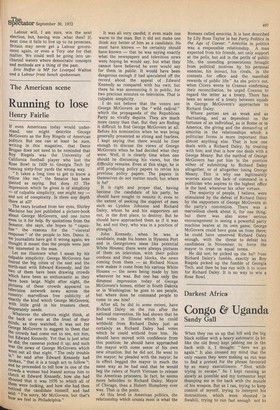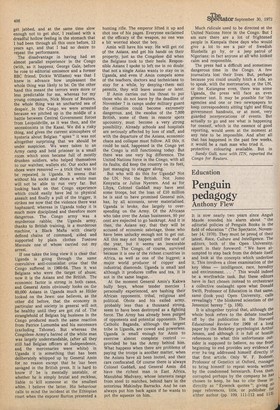Congo & Uganda
Sandy Gall
When they ran us up that hill and the big black soldier With a heavy automatic (a bit like the old Bren) kept jabbing me in the back with it, I thought: "here we go again." It also crossed my mind that the only reason they were making us run was to find a pretext for the phrase favoured by so many executioners: "Shot while trying to escape." So I kept running as slowly as possible and my tormentor kept thumping me in the back with the muzzle of his weapon. But as I ran, trying to keep control of myself, trying to interpret his instructions, which were shouted in Swahili, trying to run fast enough not to get jabbed, and at the same time slow enough not to get shot, I realised with a dreadful hollow feeling in the stomach that I had been through all this once before, 12 years ago, and that I had no desire to repeat the performance.
The disadvantage in having had an almost parallel experience in the Congo (with, as it happens, George Gale, before he rose to editorial eminence and a former BBC friend, Dickie Williams) was that I knew in advance how unpleasant the whole thing was likely to be. On the other hand this meant the terrors were more or less predictable for me, whereas for my young companion, Nick Moore of Reuters, the whole thing was an uncharted sea of despair. ,In the Congo we were arrested because we pitched up in the middle of a battle between Central Government forces from Leopoldville, as it was then, and the secessionists in the Kasai. We did a risky thing, and given the current atmosphere of hysteria about Belgian " spies " it was not altogether surprising that we should be under suspicion. We were taken to an Army camp and held prisoner in a small room which soon became full of mostly drunken soldiers, who helped themselves to our watches, wallets etc. Our socks and shoes were removed — a trick that was to be repeated in Uganda. It seems that without his socks and shoes a white man will not be able to run very far. But looking back on that Congo experience which could easily have led to physical assault and finally a pull of the trigger, it strikes me now that the violence there was haphazard; whereas in Uganda today it is much more disciplined and therefore more dangerous. The Congo army was a murderous rabble; the Uganda army, thanks to British training, is a murderous machine, a Black Mafia with clearly defined chains of command, aided and supported by plain clothes Tontons Macoute one of whom carried out my arrest.
If one takes the long view it is clear that Uganda is going through the same convulsive anti-colonialist crise that the Congo suffered in 1960-64. Then it was Belgians who were the target of abuse; now it is the Asians and the British. The economic factor is strong in both cases, and General Amin obviously looks on the 60,000 Asians in Uganda much as Hitler looked on the Jews: one believes, as the other did before, that the economy in particular and society in general will not be healthy until they are got rid of. The stranglehold of Belgian big business in the Congo produced much the same reaction from Patrice Lumumba and his successors (excluding Tshome). But whereas the Congolese Army's hatred of the white man was largely understandable, (after all they still had Belgian officers at Independence, and the mercenaries were white) in Uganda it is something that has been deliberately whipped up by General Amin for no reason except that he 'nas been savaged in the British press. It is hard to know if he is mentally unstable, or whether he is simply brutal and reckless, liable to kill someone at the smallest whim. I believe the latter. His behaviour calls to mind the incident at the Ethiopian court when the exporer Burton presented a hunting rifle. The emperor lifted it up and shot one of his pages. Everyone exclaimed at the efficacy of the weapon, no one was a bit worried about the boy.
Amin will have his way. He will get rid of the Asians, and get his hands on their property, just as the Congolese did when the Belgians took to their heels. Responsible Asians I spoke to left me in no doubt that not a single Asian wants to stay on in Uganda, and even if Amin compels some of the teachers, doctors and technicians to stay for a while, by denying • them exit permits, they will leave sooner or later.
If Amin carries out his threat to put those who do not leave by the deadline of November 7 in camps under military guard the situation could become extremely dangerous, and the exodus of the 7,000 British, some of them in remote spots upcountry, must become a very strong possibility. Already schools and hospitals are seriously affected by loss of staff, and with the departure of the Asians, economic chaos and collapse must follow. All this, it could be said, happened in the Congo yet the Congo is still functioning today. But there was one very big difference. The United Nations force in the Congo, with all its faults, did keep the country on its feet, just managing to stagger along.
But who will do this for Uganda? Not the UN. Not the British. Not Jomo Kenyatta or Julius Nyerere. And as for Libya, Colonel Gaddafi may have sent some troops, but the loan of £10 million he is said to have promised General min, has, by all accounts, never materialised. Uganda is broke, due largely to overspending on the Army. Of the Africans who take over the Asian businesses, 90 per cent are expected to go bankrupt. And it is then, the Asians say, that they will be accused of economic sabotage, those who have been unlucky enough not to get out. All this may not happen until the end of the year, but it seems an inexorable process. The Congo, of course, survived because it is one of the richest countries in Africa, as well as one of the biggest; a major world producer of copper and industrial diamonds. Uganda is small and although it produces coffee and tea, it is not in the same league.
At the moment General Amin's Kakwa bully boys, whose tender mercies I personally experienced, are bashing their African opponents, tribal, religious and political. Obote and his exiled army, probably less than a thousand strong, seem to have been destroyed as a fighting force. The Army has already been purged of opponents and potential opponents. The Catholic Baganda, although the largest tribe in Uganda, are cowed and powerless. Uganda is small enough for Amin to exercise almost complete control — provided he has the Army behind him. What happens when there are problems of paying the troops is another matter, when the Asians have all been looted, and their cars confiscated. Of course there is always Colonel Gaddafi, and General Amin did have the richest man in East Africa, Manubhai Madvany, whose interests range from steel to matches, behind bars in the notorious Makindye Barracks. And he can always put him back again if he wants to pvt the squeeze on him. Much ridicule used to be directed at the United Nations force in the Congo. But I am sure there are a lot of frightened people in Kampala these days who would give a lot to see a pair of Swedish Bluebells go by, or a jeep patrol of Nigerians: in fact anyone at all who looked calm and responsible.
The press had a difficult and sometimes dangerous time in the Congo. A few journalists lost their lives. But, perhaps because you could usually hitch a ride, so to speak, with the mercenaries, or the UN, or the Katangese even, there was some Uganda, the press will face an even grimmer test. It may be possible for the agencies and one or two newspapers to keep correspondents sitting tight and filing government handouts, or at most, very guarded interpretations of events. But actually to go and see what is happening for oneself, which is the essence of good reporting, would seem at the moment at any rate to be impossible. And after all that has happened in the past few weeks, it would be a rash man who tried it.
protective colouring available. But in Sandy Gall, now with ITN, reported the Congo for Reuters.











































 Previous page
Previous page